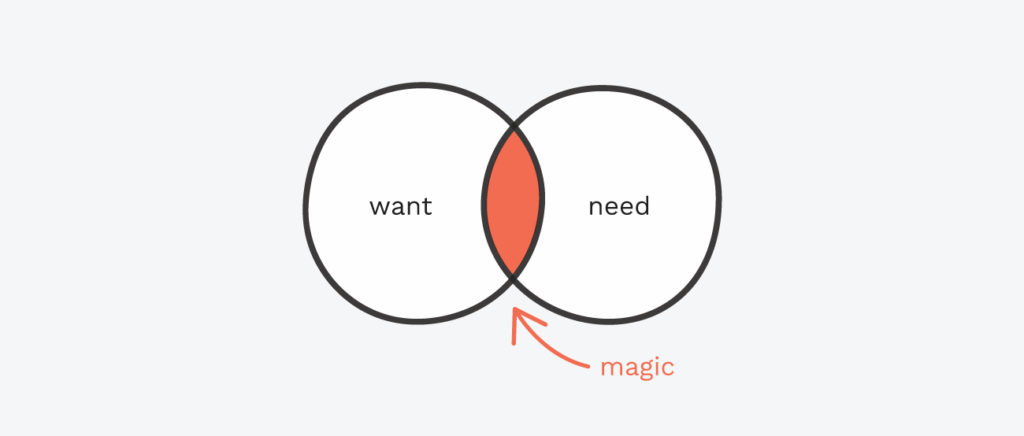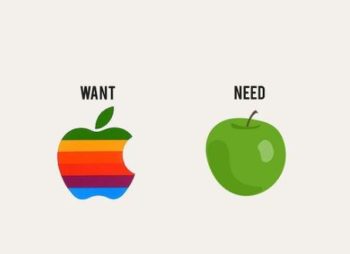
Learning the art of balancing your wants and needs leads to a life of satisfaction and abundance. This post provides five simple steps on how to differentiate between what you want and what you really need in your life to feel safe, healthy and nurtured. (Estimated reading time: 6 minutes)
“You can’t always get what you want, but if you try, sometimes, you might find you get what you need.”
— Rolling Stones
It’s hard not to get overwhelmed by the many options available in the modern marketplace. Whether you’re walking down a supermarket aisle, or shopping in a mall, or haggling with merchants at a bazaar, you’ll be inundated with brands, products, and services, all vying for your business. Our consumer-centric society deludes us into believing that we can have (and need) it all!
Despite all the freedoms that capitalism bestows on us, we need to be careful of its illusory effect on our psyche. Just because we have a lot of options does not mean that we should partake in all of them. Advertisers use a combo of striking words and captivating imagery to attract our attention and to plant the seeds of desire.
When we were kids, we didn’t want to narrow down our choices and compromise on the things we wanted, because all we cared about was having fun and satisfying our egos. We may have pleaded with our parents to buy us that toy we so wanted – a doll, stuffed animal, video game console, or a bicycle – and if they didn’t acquiesce, we threw tantrums to get it.

As adults, we may still exhibit these inner child traits. If you were raised with sound financial education. you’re more likely to have a balanced perspective on your finances. If, however, you developed a dysfunctional relationship with money due to a lack of guidance around money matters, it can lead to a hazy and complicated attitude around money.
I was one of those people unable to draw a line between what separated my wants from my needs. It wasn’t until I worked with a money coach that I established financial literacy and began seeing money as a form of energetic currency. How I choose to allocate my money says a lot about me as a person – my maturity, priorities, and my values.
Financial responsibility begins with a solid understanding of who we are at our core, and what’s most important to us. This will give us the clarity and foresight to decide what will bring us satisfaction.

In addition to developing deeper self-awareness, we need to be able to distinguish between need and wants and strike a balance between the two.
A need is something that a person must have to survive and thrive. Not fulfilling a need can cause a person to suffer mentally, emotionally, physically, and spiritually. Some examples of needs include basic necessities such as food, water, shelter, love, security, and rest. Maslow’s hierarchy of needs expands on our needs by categorizing them and ranking them based on their importance.
A want, on the other hand, is a desire that is personal and unique to each one of us. It’s something that you would like to have, but you would be able to live without. Some examples include consumer items such as iPhones, PlayStations or a visit to a hair salon or spa.
We may want a romantic partner who is tall, dark, handsome, and rich when what we really need is someone who is loyal, caring, and who respects us. There are usually a lot of emotions surrounding a want that inject passion into our pursuit of them.
We need to watch out for the addictive quality of wants and getting too attached to them. We’ve all heard of the people who go on shopping sprees, max out their credit cards, and accumulate debt in the process.

It’s only by gaining spiritual insights that we can see the futility in our blind chase for happiness through fulfilling our “wants”. Travel writer Pico Iyer, points out that ‘voluntary simplicity’ and getting rid of excess stuff is a big part of the formula for happiness. He writes:
“I’m no Buddhist monk, and I can’t say I’m in love with renunciation in itself, or traveling an hour or more to print out an article I’ve written, or missing out on the N.B.A. Finals. But at some point, I decided that, for me at least, happiness arose out of all I didn’t want or need, not all I did. And it seemed quite useful to take a clear, hard look at what really led to peace of mind or absorption (the closest I’ve come to understanding happiness).”
Adopting a mindset of simplicity doesn’t mean that we have renounce all our worldly desires and subject ourselves to the ascetic lifestyle of a monk. It does mean that we should aim to find lasting forms of happiness, such as love, peace, and balance, rather than transient and shallow material forms.
These four steps will help you access those lasting forms of happiness by striking a balance between your wants and needs:
1. Adopt a mindset of simplicity: The culture of materialism and celebrity fans the flames of desire for the things you don’t really need. The truth of the matter is that you don’t really need that much to be happy. The things that are going to truly fulfill you are simple if you adopt a mindset of simplicity. Of course, you don’t have to deprive yourself of life’s goodies. You simply need to adjust your expectations and train yourself to find happiness in the small things.
2. Prioritize and list your needs and wants: Reflect on your priorities in the present moment. Ask yourself: What really needs your urgent attention right now? Where do you think you should spend your energy and resources so that you receive the highest return on your investment? What actions are going to be conducive to your long-term happiness? What can wait for a few days/weeks/months? Create a list that divided into two columns, each one labeled ‘needs’ and ‘wants’.
Write down your responses between these two columns and decide when you would like to meet each target. Remember to avoid judging your needs and wants – instead, use it as a tool that motivates you to take action.
3. Maintain self-control and discipline: Sticking with the needs and wants that you’ve written down on your list requires commitment. It may not be easy, especially if you’re someone who has a tough time controlling your impulses and gets carried away. If you find yourself under the grip of an addictive pattern that blurs the line between your wants and needs, stop, take a deep breath, and ask yourself these questions: Do I really need this to survive? Why do I need or want this item? Do I already have something similar? How will I feel after acquiring this? What effect will it have on my finances and my self-confidence? By asking yourself these questions, you’ll make more conscious and wise choices.
4. Develop a practice of gratitude: An attitude of gratitude will create feelings of abundance and prosperity no matter how much we have in our lives. Cultivate a daily practice of noticing both the big and little things that you’re thankful for such as the food on your table, the roof above your head, the clothes you wear, your health and safety, and anything else that you cherish. There are people out there who fantasize about the life you’re living and all the privileges that you enjoy.
All of us are born into this world with nothing, and we’ll carry nothing out when we leave it. Make it worthwhile by working towards creating a legacy that meets not just your needs, but the needs of those who really need it.
All my best on your journey,
Seline

Question: What are/have been the main challenges that you’ve faced when it comes to balancing your wants and needs?
Did you like this post? Sign up below and I’ll send you more awesome posts like this every week.

I honestly think the biggest issue with the world today is that people can no longer distinguish between a want and a need, or at least they are unwilling to admit when something is simply a want and not a need.
We may all WANT to get into Harvard but we all NEED a good education. We all may WANT to have a perfect looking body but we all NEED good affordable healthcare.
I think a lot of the issues we are dealing with in the world today and a lot of the conflicts could be solved or at least reduced if we could distinguish between wants and needs again!
Hey Seline – I think this is very important! So many people need to learn this and figure out how to distinguish a want from a need. I am so tired of seeing so many people whine and cry about not getting things they think they need but it really is just a want.
We as a society need to learn to tell a want from a need. Its killing us as a society to not be able to do this simple thing!
Sari